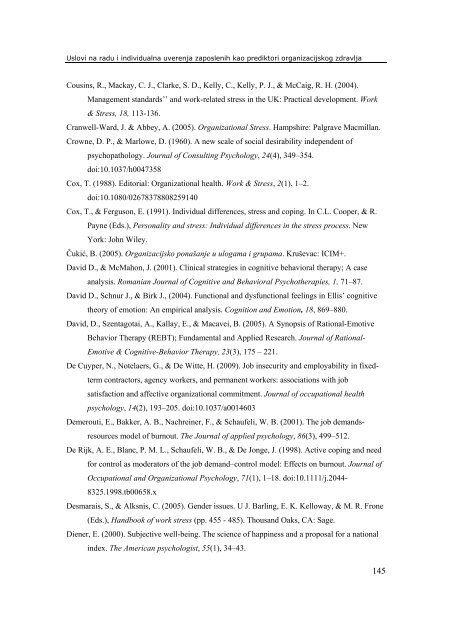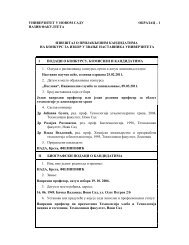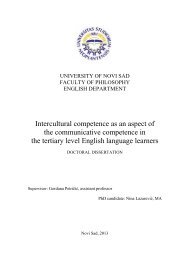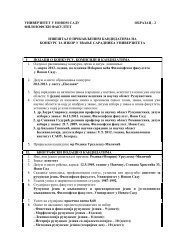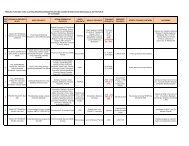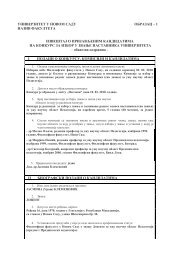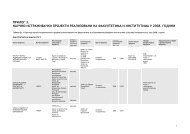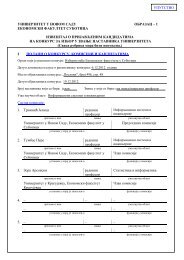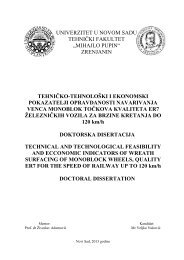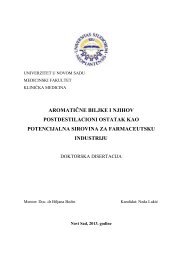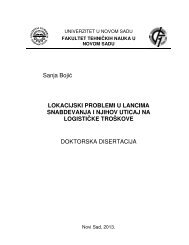Univerzitet u Novom Sadu Filozofski fakultet Odsek za psihologiju ...
Univerzitet u Novom Sadu Filozofski fakultet Odsek za psihologiju ...
Univerzitet u Novom Sadu Filozofski fakultet Odsek za psihologiju ...
Create successful ePaper yourself
Turn your PDF publications into a flip-book with our unique Google optimized e-Paper software.
Uslovi na radu i individualna uverenja <strong>za</strong>poslenih kao prediktori organi<strong>za</strong>cijskog zdravlja<br />
Cousins, R., Mackay, C. J., Clarke, S. D., Kelly, C., Kelly, P. J., & McCaig, R. H. (2004).<br />
Management standards’’ and work-related stress in the UK: Practical development. Work<br />
& Stress, 18, 113-136.<br />
Cranwell-Ward, J. & Abbey, A. (2005). Organi<strong>za</strong>tional Stress. Hampshire: Palgrave Macmillan.<br />
Crowne, D. P., & Marlowe, D. (1960). A new scale of social desirability independent of<br />
psychopathology. Journal of Consulting Psychology, 24(4), 349–354.<br />
doi:10.1037/h0047358<br />
Cox, T. (1988). Editorial: Organi<strong>za</strong>tional health. Work & Stress, 2(1), 1–2.<br />
doi:10.1080/02678378808259140<br />
Cox, T., & Ferguson, E. (1991). Individual differences, stress and coping. In C.L. Cooper, & R.<br />
Payne (Eds.), Personality and stress: Individual differences in the stress process. New<br />
York: John Wiley.<br />
Čukić, B. (2005). Organi<strong>za</strong>cijsko ponašanje u ulogama i grupama. Kruševac: ICIM+.<br />
David D., & McMahon, J. (2001). Clinical strategies in cognitive behavioral therapy; A case<br />
analysis. Romanian Journal of Cognitive and Behavioral Psychotherapies, 1, 71–87.<br />
David D., Schnur J., & Birk J., (2004). Functional and dysfunctional feelings in Ellis’ cognitive<br />
theory of emotion: An empirical analysis. Cognition and Emotion, 18, 869–880.<br />
David, D., Szentagotai, A., Kallay, E., & Macavei, B. (2005). A Synopsis of Rational-Emotive<br />
Behavior Therapy (REBT); Fundamental and Applied Research. Journal of Rational-<br />
Emotive & Cognitive-Behavior Therapy, 23(3), 175 – 221.<br />
De Cuyper, N., Notelaers, G., & De Witte, H. (2009). Job insecurity and employability in fixedterm<br />
contractors, agency workers, and permanent workers: associations with job<br />
satisfaction and affective organi<strong>za</strong>tional commitment. Journal of occupational health<br />
psychology, 14(2), 193–205. doi:10.1037/a0014603<br />
Demerouti, E., Bakker, A. B., Nachreiner, F., & Schaufeli, W. B. (2001). The job demandsresources<br />
model of burnout. The Journal of applied psychology, 86(3), 499–512.<br />
De Rijk, A. E., Blanc, P. M. L., Schaufeli, W. B., & De Jonge, J. (1998). Active coping and need<br />
for control as moderators of the job demand–control model: Effects on burnout. Journal of<br />
Occupational and Organi<strong>za</strong>tional Psychology, 71(1), 1–18. doi:10.1111/j.2044-<br />
8325.1998.tb00658.x<br />
Desmarais, S., & Alksnis, C. (2005). Gender issues. U J. Barling, E. K. Kelloway, & M. R. Frone<br />
(Eds.), Handbook of work stress (pp. 455 - 485). Thousand Oaks, CA: Sage.<br />
Diener, E. (2000). Subjective well-being. The science of happiness and a proposal for a national<br />
index. The American psychologist, 55(1), 34–43.<br />
145


